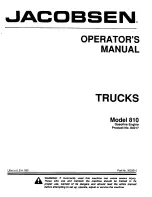
STARTING AND OPERATING
115
(Continued)
(Continued)
T
RAILER
A
ND
T
ONGUE
W
EIGHT
Never exceed the maximum tongue weight
stamped on your bumper or trailer hitch.
Weight Distribution
Consider the following items when computing the
weight on the rear axle of the vehicle:
The tongue weight of the trailer.
The weight of any other type of cargo or equip
-
ment put in or on your vehicle.
The weight of the driver and all passengers.
NOTE:
Remember that everything put into or on the trailer
adds to the load on your vehicle. Also, additional
factory-installed options or dealer-installed options
must be considered as part of the total load on
your vehicle. Refer to the Tire And Loading Infor
-
mation placard for the maximum combined weight
of occupants and cargo for your vehicle
T
OWING
R
EQUIREMENTS
To promote proper break-in of your new vehicle
drivetrain components, the following guidelines
are recommended.
Perform the maintenance listed in the Scheduled
page 209. When towing a trailer,
never exceed the GAWR or GCWR ratings.
WARNING!
Always load a trailer with 60% of the weight in
the front of the trailer. This places 10% of the
GTW on the tow hitch of your vehicle. Loads
balanced over the wheels or heavier in the rear
can cause the trailer to sway severely side to
side which will cause loss of control of the
vehicle and trailer. Failure to load trailers heavier
in front is the cause of many trailer collisions.
CAUTION!
Do not tow a trailer at all during the first
500 miles (805 km) the new vehicle is driven.
The engine, axle or other parts could be
damaged.
Then, during the first 500 miles (805 km) that
a trailer is towed, do not drive over 50 mph
(80 km/h) and do not make starts at full
throttle. This helps the engine and other parts
of the vehicle wear in at the heavier loads.
WARNING!
Make certain that the load is secured in the
trailer and will not shift during travel. When
trailering cargo that is not fully secured,
dynamic load shifts can occur that may be
difficult for the driver to control. You could lose
control of your vehicle and have a collision.
When hauling cargo or towing a trailer, do not
overload your vehicle or trailer. Overloading
can cause a loss of control, poor performance
or damage to brakes, axle, engine, transmis
-
sion, steering, suspension, chassis structure
or tires.
CAUTION!
4
22_VF_OM_EN_USC_t.book Page 115
Содержание PROMASTER 2022
Страница 53: ...51 GETTING TO KNOW YOUR INSTRUMENT PANEL BASE MIDLINE INSTRUMENT CLUSTER 3 22_VF_OM_EN_USC_t book Page 51 ...
Страница 55: ...GETTING TO KNOW YOUR INSTRUMENT PANEL 53 INSTRUMENT CLUSTER 3 22_VF_OM_EN_USC_t book Page 53 ...
Страница 247: ...SERVICING AND MAINTENANCE 245 8 22_VF_OM_EN_USC_t book Page 245 ...
Страница 282: ......



































